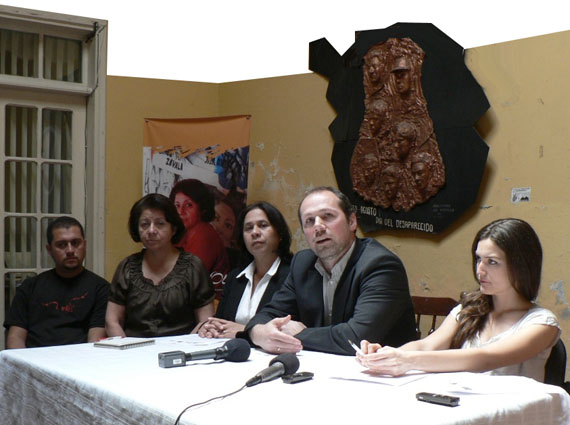|
IUF Latin
America and the national and international organizations that participated in
the International Mission to Bajo Aguán held a press conference to present the
preliminary findings of their investigation.
The
International
Mission
that took place
from Feb. 24 through Mar. 5, 2011 observed on the field the human right
situation in Bajo Aguán,
and is now presenting the initial findings of its investigation.
According to
the press release distributed to the media at the conference, “The Mission
has established with concern that the repression and violence against members of
the peasant communities and organizations has not stopped, and that they are
totally exposed and vulnerable in the face of biased authorities.”
“Moreover, the
deadly crimes committed in
Bajo Aguán
are going unpunished, making it easier for human rights violations to be
repeated.”
Most alarmingly, the Mission found
that in all 19 murder cases committed against peasants over the past year not a
single inquest was conducted and no arrest warrants were issued.
It also
denounces the multiple violations of the right to physical integrity perpetrated
by both members of the police and private security guards hired by the area’s
large landowners and palm producers to patrol their estates.
In addition,
the press release reports cases of kidnapping and torture, multiple injuries,
and sexual abuse.
“There’s a very
dense atmosphere of repression against peasant families, and forced evictions
continue. This is a blatant violation of human rights, which is of great concern
to us,” Martín Wolpold-Bosien, Central American coordinator of
FIAN International, told Sirel.
|
The
Mission observed that the current rural development model based on agribusiness
and land concentration must be changed in favor of “policies that promote
sustainable peasant farming, and the implementation of a comprehensive agrarian
reform. |
The
International
Mission’s
investigation
further
revealed a total lack of compliance with the agreements signed with peasant
organizations and with legal provisions regulating agricultural matters, and an
alarming climate of stigmatization and criminalization of peasant struggles.
“Repression,
violence, defenselessness, impunity, and vulnerability of the peasant population
continue. We are going to denounce all of this to the international community,”
Wolpold-Bosien said.
In view of this
situation, the
International
Mission
called on national authorities to investigate the murders and other crimes
committed in the area and prosecute the perpetrators, and to act immediately to
put a stop to the repression and violence against the peasant movement.
It also
demanded that the authorities comply with all the agreements signed and apply
any relevant legal provisions in force, and that they facilitate the
population’s access to land, health, education, and housing.
Lastly, the
members of the Mission
observed that the current rural development model based on agribusiness and land
concentration must be changed in favor of “policies that promote sustainable
peasant farming, and the implementation of a comprehensive agrarian reform.”
The
international community, in turn, was asked to contribute with concrete and firm
measures and greater protection for the people who are at risk, by “conditioning
its cooperation to full respect for human rights.”
The
international community must also ensure that the financial cooperation it
provides the government and private companies “does not contribute to human
rights abuses,” and it was asked to review any financial agreements signed “with
police forces and private security companies that may be implicated in acts of
violence, harassment, or human rights violations in the region.”
“It has been a
very enriching and significant experience, fruit of the efforts of all the
organizations that have participated in this
Mission.
Sharing the tragedy and suffering of the affected population has strengthened
our commitment with their struggle.”
“We’re going to
follow this situation very closely, while we accompany the struggle for human
rights and against impunity,” Wolpold-Bosien concluded.
The final
report will be presented to the Truth Commission (CdV), the
Inter-American Commission for Human Rights (IACHR), the United Nations’
Human Rights Council (HRC), the European Union, and the
International Criminal Court (ICC).

|